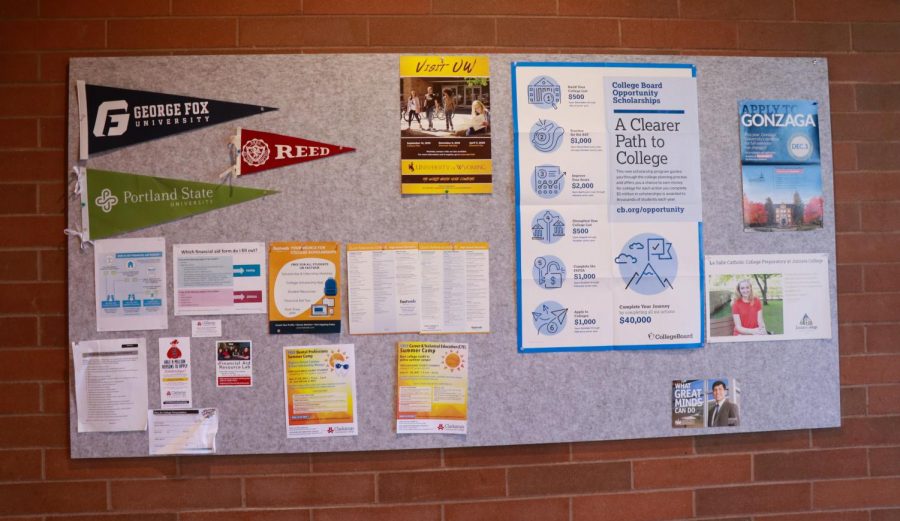What I’ve Learned About the College Application Process — And What You Should Know, Too
If you want to apply to a larger number of schools, be prepared to endure a lot of work on top of school and other obligations you might have.
April 21, 2021
I’ve spent a good portion of my high school experience thinking about college, whether it was trying to get my grades up, researching possible schools to attend, or choosing classes that would make my applications look more impressive.
Although my senior year wasn’t how I had imagined it would be, the college process was still a huge part of it.
Overall, I had a unique college preparation experience due to COVID-19 getting in the way of the usual ACT and SAT and the ability to visit colleges early on in the year.
There were many aspects to the college process that I was unsure of before they transpired, and along the way, I learned a lot about the areas that could have been easier and for those who haven’t gone through the process yet, I can share what I’ve learned.
The sooner you start on your essays, the easier it will be.
I started my essays on Aug. 1 and it was relieving to know I had given myself enough time to write and create multiple drafts to make them the best they could be.
When submitting your essays and application, most colleges will require a fee, so make sure to look into how much each school is charging. If you are from a low-income household, you might qualify for a fee-waiver. This was something that worked in my favor during the process.
Before beginning my applications, I wish I would have known that applying to a ton of colleges is not always the smartest idea. In full transparency, I applied to 13 schools, and it was one of my biggest regrets.
Because I applied to so many schools, I was not prepared for the number of essays I would have to write, especially after some of the schools I was interested in were requiring more than one response. This was stressful for me and made the process more difficult than it needed to be.
If you want to apply to a larger number of schools, be prepared to endure a lot of work on top of school and other obligations you might have.
When compiling a list of prospective colleges, you should make sure to reflect on what kind of school you truly want to attend. It might make sense to ask yourself these questions: Would you like to go to a private or public institution? Would you prefer a small or large student population? Do you want to stay close to home or travel far away?
When I was applying to colleges, I knew that I wanted to study at a smaller school that was somewhat close to home and had an excellent pre-law program. Knowing these prerequisites allowed me to select somewhere that I could see myself going. I also relied on a few schools that didn’t check off everything I wanted but that were on the more affordable side in the case that I didn’t receive enough financial assistance from the schools that I admired.
After submitting your applications to prospective colleges, it’s important to be aware of the fact that you will likely receive a lot of paper mail and emails from several schools.
I would recommend that you check your inboxes frequently and designate folders to each school you applied so that you can organize all the mail and ensure that you won’t lose something that has the potential to be important later on.
Throughout your college application process, it is also critical that you take advantage of financial aid opportunities, especially FAFSA. I suggest filling out your FAFSA before applying to colleges as it makes things significantly easier and it might help you get more resources before they run out.
All in all, my greatest takeaway is that visiting colleges is an extremely important piece of the process. From the beginning, most colleges were not allowing prospective students to explore their campuses, and I thought I was going to have to make a choice without visiting. However, in January, some of the schools I applied to opened their doors and allowed me to take a look around.
Visiting college campuses allowed me to get a feel for each school and helped me discover what kind of location and scenery I preferred, which allowed me to decide where I actually wanted to go.
When it comes to actually getting into college there are a lot of misconceptions about GPA. Although GPA is important, it is not everything especially if you are applying to less selective colleges.
Even though it’s true that no matter how bad GPA-wise you do in high school there are still opportunities for you to go to college, grades are still important because they pay off even if it’s with a less selective school. This is because less selective schools often determine how much money in merit scholarships you get depending on your grade point average.
So, if you are reading this as a student who is yet to apply to college, use this as motivation to get the best grades you can for a more affordable experience that pays off in cash.
And if your grades aren’t looking great, you can still improve, as I did so throughout my high school experience. During the first semester of my freshman year, my GPA rested at a 3.3, but since, I’ve been able to pull my average up to a 3.7. Nothing is impossible.
My college process is still not over as I have yet to make a decision on where to go and to be honest, my top choices have drastically changed since August when I first started this process and that’s OK.
It’s not a problem to not know where you want to go or what you want to do. This life is your journey and through that journey, you just might find what works in your favor.
At the end of the day, the college process is stressful. However, keeping yourself organized and staying on top of deadlines will help the process feel less overwhelming.





